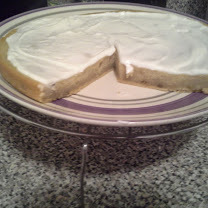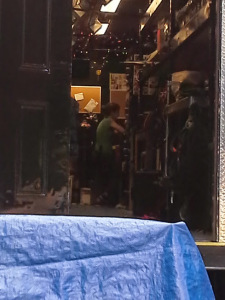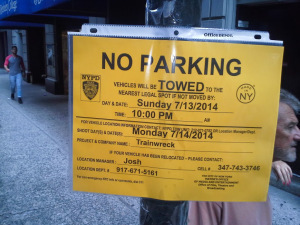Rochelle Campbell's Blog: The NoteBook Blogairy, page 22
August 6, 2014
Gluten Free Is For Me…
So, I’ve sat with the information that I have been officially diagnosed with celiac sprue disease for a bit over a week now. While I knew I had an issue with gluten I guess I hoped that the test would come back something other than positive. And, initially, it did.
On the first trip back to my GI doctor after having drawn 1 million vials of blood, the lab forgot/did not do the main genetic test.
On the second trip back, the lab’s results on the genetic test was negative. With my abnormal transglutaminase test result late last year, the anecdotal information that was consistent with the traditional misdiagnosis of celiac (IBS, belly issues, itchy rash, anemic beyond belief, malnourished diagnosis years ago…) my doctor was baffled as to the negative genetic test.
I asked for a second lab test done at a different lab and the doctor wanted to see the backup documentation to the genetic test already done. All of the percentages were not sent to the doctor; just the lab’s assessment and interpretation. Needless to say, when my doctor saw the actual lab test results and the levels the genetic test was NOT negative. It was clearly positive therefore celiac sprue cannot be ruled out.
So, days before my birthday it was confirmed that my various nutty symptoms including losing my sense of smell were all associated and related to having celiac disease.
I am so not the picture of celiac disease. First off, I am of Caribbean-American (read: Black) descent. Celiac sprue is prevalent in Mediterranean and Celtic cultures. So, now a deep search into my heredity is warranted.
Right now, I have no words. This is not a life-threatening condition but it is considered an autoimmune issue so my children must get tested. Until I know for sure, regular birthday cakes, grilled cheese sandwiches, biscuits and the like will not even be introduced to her. I’d love to be able to say that in the 13 months since I’ve been gluten-free I learned how to make a tasty loaf of bread in my Breville bread maker. And, that I can make a killer gluten-free cheesecake — I can’t. I’ve been too scared and unsure of which flours to use and in what precise proportions.
Gluten-free baking is different from any other type of baking I’ve ever done. And here’s the true rub — I owned and ran my own bakery for about 8 years. Yup. I’m a TOTAL gluten head. Dunkin’ Donuts was my favorite place in the whole wide world, second only to every delicious smelling bakery I’ve ever passed. I used to eat dessert at every meal. When I was a vegan I made VITAL WHEAT GLUTEN RIBS from scratch! I LOVED wheat/gluten. I made the bestest fluffy biscuits using my Grandmother’s recipe.
So, now that I have to leave that stuff alone…what do I do? I just gave away my cake decorating paraphernalia just yesterday. Why ice cakes when I can’t bake them?
I’m sure that this is some sort of grieving process/withdrawal reaction but it feels very final. I guess things will start looking up when I can make a tasty gluten-free cake that does not look like my sad lavender flower birthday cake.


August 3, 2014
8 Things I’ve Learned About Writing a Novel
Currently, my work in progress novel is just over 90,o00 words. I’ve been working on it in fits and starts since November 2012. Since that time, I found out I was pregnant, gave birth to my daughter, had a child graduate HS, helped said child go off to China for a summer, get another child to gymnastics camp, work a regular day job throughout it all since baby was 2 1/2 months old, and — oh, yeah figure out a gluten free diet.
So, I’ve been a bit busy as all of us are. However, in the 19 months that have passed since I began my supernatural thriller novel, I have learned a few things that I did not expect to learn from the novel writing process. I thought writing was setting down the story in a straight-forward outline which is plotted out beat-for-beat so all one must do is write the flesh and flash and slip it onto the bones you’ve already laid down. Yeaaah…right.
Here is what novel writing is REALLY all about.

1. Writing a novel takes love. Yes, you read that right. When you are going to sit down and be friends with a piece of work for the next umpteen months/days/years you BETTER love it. What does that mean? It means you must be loyal to your novel. Think about it often. Dream about it. And, of course, write it out fully.

2. Writing a novel does not mean you must finish the novel you began. [What?!] Yes, this sounds like an oxymoron. Literally speaking, it is. However, as any writer can tell you — it’s not. I wrote a short story that eventually turned itself into a novel. It was called “Opening Up”. After some months passed after I wrote it, it became clear to me that the novel I wrote was NOT the novel it was supposed to be. The main character of this novel was the wrong POC for this book. The true main character is a character that came to the fore about 1/3 of the way into the book. Therefore, I have to totally re-write this novel from the new perspective.
3. Writing a novel is a learning process. You are not necessarily learning about the characters, the setting of the story, or working on the sound of the speech patterns of your characters. You are learning about yourself, the writer, who will be stepping into the background and allowing the characters to speak, act, dance and generally entertain the writer — who in turn entertains the reader. Therefore…
4. Writing a novel CAN take a lot of time depending upon how stubborn the writer is! If the writer does not allow himself/herself the luxury of being an ‘empty’ vessel for the story to come and fill them up it may take a long time for the story to wind its way through the synapses and sinews of the writer’s mind and body to come into being. In fact, if the writer is truly stubborn the story may never see the light of day.
5. Writing a novel is formulaic — not in the sense of one thing follows this thing that follows another thing. Not, not a linear formula. Writing a novel is akin to allowing the formula to happen to you. Here is the magic novel writing formula –
WRITER + MUSE + PATIENCE + RELAXING + RESEARCH + MEDITATION = NOVEL
6. Writing a novel is cathartic.
7. Writing a novel breaks down barriers in one’s mind and allows the writer to break free of inner obstacles [in life]. By overcoming challenges in writing, the writer frees up mental/head space for the work-in-progress novel.

8. Writing a novel is good for your skin. With all of the time the writer has while waiting for the muse to elaborate on certain scenes/characters &/or, the mood for a chapter, the writer will have plenty of time for facials — either homemade ones, or at the spa! [Okay, so maybe I just wanted a spa trip, okay??!!? Thank you, Spa Castle!]
In the end, when you’ve written the last word and hit the save icon, you know you’ve made a great accomplishment. You are in the company of great minds throughout time who have gone through a similar journey and have come out with the unique product of imaginative wordplay.
Congratulations Writer!!!!!
Know that you are supremely #AWESOME!


July 31, 2014
Book Thoughts ~ Trust the Process: An Artist’s Guide to Letting Go
I’m in the middle of reading Trust the Process: An Artist’s Guide to Letting Go by Shaun McNiff. I thought it was going to be a quick informative read. It was a book recommendation from my Gotham Writing course instructor, Michael Davis.
The course was 11 weeks in length; plenty of time to get the work done and develop some new short stories. However, it didn’t quite tick along that way. I became stuck in the “Voice” module. I began to receive feedback that made me question what my content message was and how/why I was portraying people and situations in my stories the way I had. It was a very challenging few weeks in which I questioned everything I have ever written; it was a total writing existentialist crisis. Who am I as a writer?
I realized after many weeks of contemplation that I wrote things to ‘please’ people — my mentors, my friends, my writing instructors. I also catered to the idea that writing what was “good and popular” was not selling my writer’s soul. It was simply a fiscally responsible thing to do…
Hence, Michael’s recommendation for me to read the McNiff book. Michael shared 3 books with me but the last one, this McNiff book, caught my attention. Something about Trusting and Letting Go two concepts a staunch New Yorker does not pander to easily.
However passages like this one stopped me in my virtual thought tracks.
In my work with people I consistently find that the most provocative and useful stimulus for reframing is the declaration that what disturbs you the most may have the most to offer in your creative expression. We can tap into the power of our discontents and use them as sources of transformation. In my perverse way, I look for the greatest weaknesses in my life, in another person’s life, or the culture of an organization, with the belief that these areas are most receptive to creative alchemization. There is a power of reversal in extreme conditions that does not exist within the stable center. ~ Shaun McNiff
Take what most disturbs you about a person, place or thing and use it as the motivating force, the impetus for a new project. The idea was astounding to me. I buried things I didn’t want to deal with in positivity (You’ll-see-it-when-you-believe-it type stuff). Yet, I still felt stymied and not as creative and productive as I felt I could be.
Creative practice requires the ability to change perspectives on a situation. People who are stuck, or blocked, are locked into points of view. They keep hammering away at the same tired themes or useless patterns. ~ Shaun McNiff
Thank you, Shaun! Psychology 101, right? Maybe, but this just didn’t occur to me.
When we use our disturbances as materials of expression we see that everything in life is fuel for the creative process. Creativity puts toxins to good use.
This is like homeopathy for the writer’s soul! Take a little bit of the thing that can kill your writing spirit and put a little bit of it in your writer’s cup and sip on it as your Muse spins a tale based upon the dastardly deeds of said discontents. Before you know it, you have a brand new project in front of you and you wonder how it came about. It came about because you let go of things that are no longer needed, necessary or even wanted any longer. Habit keeps us tied to past negative behaviors.
McNiff is trying to get the reader to see that divorcing oneself from the habit will produce changed results.
While I’m only at 43% of the book my perspectives have changed. My WIP, the supernatural thriller, is being wholly re-worked. Re-slanting, re-vising, re-thinking and definitely re-framing is what this book needed because I needed it.
Signing out,
The NoteBook Blogairy


July 29, 2014
Random Thoughts About This-er and That-er
Okay, it was my birthday earlier this week and I had a lovely mass of birthday well-wishes, tweets & status updates sent my way in person & online. It was a very cool few days (I tend to stretch out my birthday as LONG as humanely and adult-ly possible!).
Was taken to dinner at Duane Park. I went shopping. I played with my baby daughter. I joked around with my teenage son while picking him up from gymnastics camp. I blogged. I (attempted) to bake a gluten-free cake. I threw out said “cake”. Went to The Delancey for drinks & an after dinner drink with friends. [Of course we went to the Rooftop!] Went to another Brooklyn rooftop dining spot and had an after-birthday birthday dinner…I’ll stop now.
I had a really relaxed/fun busy time doing a bit of this-er and that-er.
In no particular order, here’s a bit of a montage of my birthday dayz…


July 28, 2014
10 Things You Must Know About Twitter
Please note: This article reblogged from M. Le’Mont’s website. See original article here.
Updated- 06/06/2014 AHA Book Program at bottom page (Authors Helping Authors)
The headline read: TWITTER EXPLAINED (Like You’re An Idiot)
Out of respect for your time here’s the skinny of it. FOLLOW People that RETWEET and you must also RETWEET. Now please, read on.
If you want more followers, or you want to sell more books on Twitter, then you need to read this article. For the majority of you, I’m sure you’ve heard it before, but you insist on following the majority that use the direct sell approach, “Buy my new book on Amazon for 0.99 cents.” Believe me, when I say nobody cares. The trick is to find people that do care. If you write great blogs are retweet the works of others, the readers will find you.
I must confess that I have not seen a more committed space than authors, writers, bloggers, network marketers, which I’m happy to support and be a part of. I wish I could wave a magic wand and give everyone a zillion Followers.
However, if you believe as I do that you can write it now, and sell it forever, then I’m going to share with you some amazing observations that will help you grow your Twitter account.
1. Contrary to popular belief, it’s not how many Followers you have that matters, but who you Follow that makes all the difference in the world.
2. You must Follow people that Retweet. It’s just that simple. This way, you will get more people reading your Tweets. Here are some startling numbers. Less than 1% of Followers receive Tweets at any given time, and of that number only 1% will read the message; 1% will click on your link, and the shelve life of a Tweet is less than 24 hours.
3. You must find a Tribe that Retweet for each other to reach a huge number of people.
4. It takes time to nurture and build a Retweet team or Tribe. Always thank members for the Retweet. But, not just an ordinary thank you. Make it special, something different that separates you from everyone else. “Thank you for joining the Retweet Team of authors helping authors, we support people that retweet.”United We Are Strong”.
5. Then practice what you preach and Retweet one of their messages.
6. The people that reciprocate will become members of your Retweet Tribe.
7. Another way to get loyal followers is to get in a space where everyone is desperately seeking results. For example, how many authors are self promoting their books and need more readers.
Why not buy the books of authors, on your Retweet team. Now I know the first thing everyone is going to say, “I’m too busy, and I don’t have time to promote other authors’ books.”
Hogwash! Do you mean to tell me that you’re not a reader, and you don’t buy books? Sure you read, and you buy books of famous authors that are not supporting you; you’re supporting them. So why not turn the table, and buy a book once a month from an author on your Retweet team.
Hell, if you don’t have time to read, so what. It’s the support that counts. I ‘m currently reading five books and there’s no pressure to finish them. My goal is to bring the Authors’ community together to support one another. If an author got a launch of a new book then the community should help promote it.
Set a monthly budget of $3.00 to buy one book of an author who’s on your Retweet team. Wow! A cup of coffee at Starbucks costs more. Now don’t count on any author reciprocating–just do it for the support.
Don’t follow what the majority of people are doing on Twitter because it’s not working. Everybody’s spamming– thinking the hard sell is the answer, believe me it doesn’t work on the Social Media. Here’s a great article by Rachel Thompson, Read This Before Sell Sell Sell Books on Twitter.
8. Retweet this article every day to your Followers, “Did you Retweet today?” Everyone must get in the habit; otherwise you’re wasting time on Twitter.
9. Twitter is all about the Retweet. It’s not about how many people are Following you. If your Followers don’t Retweet your Tweets to their Followers, then you’re Following the wrong people, and they’re taking up valuable space in your Follow count. So before you Follow Back make sure they Retweet.
10. Contrary to what people think, you don’t need 100,000 Followers. You need people that RETWEET! Sure 100,000 Followers will attract more people, but they will be people that don’t Retweet. It only looks and sounds good, but it’s meaningless.
You must be selective whom you follow because the Twitter Following limit to Followers kicks in at 2,000.
Now, if I’m correct and this strategy turns out to be the Holy Grail for selling on Twitter everyone will develop a team of super supporters.
It’s an idea that makes sense. You can grab a copy of my new book M Le’Mont The Point of No Return. Notify me @MisterSalesman Amazon, http://bitly.com/1eRSkaI
And if that’s asking too much then you can still participate by Retweeting this article to your Followers that you support authors and writers who Retweet. “United We Are Strong.”
If you want to discover something remarkable, then you have to do something completely different than anyone else.
Seth Godin said, “The Internet will not tell you what to do, but it will say here’s the microphone now go experiment and discover something great!”


July 27, 2014
Sad Gluten-Free Birthday Cake…
This is the story of a lavender gluten-free cake.
It was in the store. I brought it home.
I put it in the cabinet. It sat for several months (like two).
It was my birthday. I wanted a cake with icing.
I pulled out said cake.
I mixed it with almond milk, apple cider vinegar and oil. (Don’t say it…)
(First problem; pan too big.)
(Second problem, cake tasted chalky and heavy. Yeah, you CAN taste heavy!)
(Third problem, uhm…why don’t we just stick to the first two. We already know there’s not enough batter in the pan.)
I baked said lavender cake (fearing it was going to taste like Grandma’s soap.)
Cake came out of oven 25 minutes later.
(Uh-huh. Don’t say it, or even think it.)
Hesitated, then decided to put icing on this…I think, it’s a flapjack but the label says…cake.
Soooo…I asked if anyone in the house wanted to try it. Even the cat ran into another room.
Decided to cut and try this…cake.
Yeah, texture was WAY off. A sponge is spongier than this pancake! And the taste? Yep, soap. My 14-year-old took a bite and spit it out.
So, this is/was the tale of this Lavender Gluten-Free Cake.
Read the reviews and it’s supposed to be good. Must have lost my lavender cake mojo…


July 22, 2014
Literary Agent Spotlight: Q & A with Jennifer Chen Tran
First question, how and why did you become a literary agent?
I graduated in 2008 from law school but I have always loved books and reading. Before law school, I was originally a Fine Arts major at Washington University in St. Louis, but later majored in English Literature and minored in Legal Studies. When I went to law school I knew I wanted to go somewhere that was “non-traditional” and Northeastern, with its focus on experiential training, fit the bill. Through Northeastern University’s co-op program, I was able to apply legal skills in the context of where I was working, which ranged from the U.S. Attorney’s Office to In-House counsel at a multi-national corporation. Originally, when I graduated law school, I wanted to serve the public interest and be a government lawyer. But, as you know, 2008 was a rough time for the economy and the legal field in particular, with hiring freezes at government agencies across the board.
I transitioned to publishing because I encountered a great opportunity at The New Press who was looking for an Of Counsel. The position had originally been created for deferred summer associates but despite not being on the “big law boat” myself, I had previous publishing experience from my undergraduate days where I interned at Hunter House Publishers in Alameda, California, and Terrain Magazine, in Berkeley, CA, which set me apart. It was at Hunger House that I was first exposed to publishing in general, and I specifically learned more about both the editorial and publicity aspects of bringing a book to market. It was at The New Press that I was able to hone my legal skills in the context of publishing contracts and that is when I first learned about literary agents. I connected my love of reading with my enjoyment of being around creative people. I knew that I wanted to marry these two and being a literary agent is a perfect mix of both my left-brain analytical side to my right-brain creative side.
At this point, I could have gone the traditional route and worked my way up at an established literary agency for several years before developing my own list.
But I’ve always been an independent and entrepreneurial person and decided to take a risk and forge my own path. Publishing is also an extremely relationship driven industry and I knew that would be the aspect that I had to work on the hardest.
Penumbra Literary opened its doors in June 2012. The first year of operation I focused on building up my client list and had a sale within the first year. Since then I have had another sale this past July 2014 and another sale currently in the works, not to mention several very interesting proposals currently in development. It’s a very exciting time!
Are there any specific things that can make you fall in love with a piece of writing?
Every agent will answer that question differently. For fiction, I believe in character-driven stories with a plot that drives the reader forward. Dialogue is also very important to me, is it engaging, believable? The world in which the story’s characters live must be very rich and detailed; I want to feel immersed in that world. A lot of agents joke about the ‘missing my stop on the subway/ train’ test but I really have to agree with that. If I’m so into the story that I forget to get off at my stop, that’s a good sign! I also want authors to show me something new, relative, and timely. I am a future-oriented person especially for non-fiction. For non-fiction, I acquire in areas of business, psychology, science, parenting, and travel. I’m always open to new approaches to ideas.
For instance, my latest sale is the culmination of both a business memoir and a nuts-and-bolts how-to book on Kickstarter and crowdfunding in general. I had been in touch with Jamey Stegmaier, author of PEOPLE NOT PAWNS (to be released in Fall 2015 by Berrett-Koehler), for some time. He had become so successful creating these awesome and compelling Kickstarter campaigns for his board games that he was able to quit his day job and pursue his lifelong dream. The book is relative and timely because Jamey understands relationships and how they are leveraged differently on the social media and the internet, plus he’s the person who can best write a book like this because he has an established following, regularly blogs about Kickstarter and other crowdfunding platforms, and is living what he is practicing. I’m very excited about bringing this book to market.
On the flip side, what are major turnoffs when someone queries you?
It’s the simple things but you’d be surprised how often I encounter them:
Typos
Grammatical errors
No sense of where the book fits in the market
Not understanding promotion and platform (especially for non-fiction)
Inability to take constructive criticism
Addressing the query to the wrong agent (this really did happen to me!)
The manuscript should be polished by the time you query. Have as many people that you trust read it, but also balance the feedback while staying true to your creative vision. There is such a thing as too much feedback.
Revisions are the hardest part. I will do several rounds of editing on a project if necessary, but by the time the manuscript gets to me it should be largely polished. I want the author to be happy with what they write. I am very much a collaborative person; I don’t want to push my ideas/thoughts onto the writer’s story to such a degree that the original vision is lost. However if you’ve written a memoir and you refuse to make any changes, well, that’s a problem and I’m probably not going to sign you as a writer when you have that kind of mentality. Like any relationship, an agent-writer relationship is a two-way street and you have to be able to communicate and have similar goals for the publication in order to make it work. Although the agent should worry about the business aspect, the smartest clients are also those who “get it” and put themselves out there by continually submitting their work to publications, broadening their platform and social influence, and constantly improving on their craft.
What do you wish aspiring authors would do better?
Again, work on your craft! Workshop your stories and focus on story-crafting. Do not be an isolated writer. Give-and-take is really important in developing a great story. You can’t be afraid to share your work and get exposure for your ideas. It makes your story stronger in the long run.
Another biggie – build your platform both off and online. Use social media outlets such as Twitter and Facebook and not in a self-serving way. You can’t only tweet ‘Buy my book, buy my book’ and expect to gain followers. You have to create and give something of value in order for others to want to interact with you. It can be as simple as saying something funny or interesting.
What are you looking for right now in submissions and not getting? Are there any subjects or genres that are near and dear to your heart? What are you getting too much of?
I am getting a lot of non-fiction and genre fiction. I’m not against vampire stories but I do think that that area is a bit over-saturated and a bit passé now.
I would like to see more fiction projects especially from writers who have lived abroad. They have a wider perspective and they tend to write about themes I care about such as otherness and finding one’s place in the world. I also am interested in anything entrepreneurial and non-fiction projects that deal with social entrepreneurship.
If you’d like to query me, please send a query letter along with the first 50 pages of your manuscript to: Jennifer@penumbraliterary.com.


July 19, 2014
Finding Voice on the Path of the Worker’s Life, Part 2
So, it’s been a few days since I began wrestling with this idea of ‘voice’. I’ve been reading Shaun McNiff’s Trust the Process: An Artist’s Guide to Letting Go. One line struck me…
If the ego is always in command, there is no room for the truly unusual and new insights to appear.
Another passage that struck a cord within me was this one…
…art has to flow naturally from the streams of an individual person’s experience. Creation is a process of emanation. Nothing will happen unless we start working and allow the practice of our particular disciplines to mix with the streams of ideas and experiences that are constantly moving through daily life.
Okay. I had to stop and mull on this for a few hours. For me, this means that one has to be true to oneself and express their authentic self within their written works. There can be no dodging, bopping and weaving trying to hide behind pseudonyms. There cannot be subterfuge in creating characters that spring forth from your imagination; you cannot hide aspects of them that you’d rather not deal with.
All of these things have their place in building a particular character to express a certain type of persona for a certain type of book. But, is this the character — one who is inauthentic — in every single book you write? Then, the writing is flat, lifeless, needs to be elevated to the next level. :-)
With this is mind, I’m working on letting my characters speak and express themselves freely even if I, the author, do not sanction their views! Regarding my characters, I will stand upon and beside the 5th amendment!
That’s all for now. I’m still weaving my way through this fascinating book on the creative process. I’m understanding more and more that “writer’s block” is merely a figment of our imaginations. If we suffer from it, we just may be truly suffering from repressing something we’d rather not deal with consciously. But maybe, just maybe…it’s the right time to jump in and let go.


July 16, 2014
Finding Voice on the Path of the Worker’s Life
So, I’m in the middle of this thing called mid-life crisis. I recently had a child, my first girl, only about 2 decades after my first-born son. I’m taking this class, right? This writing class and I feel really geeked up about taking it. I’m like, Finally! I’m going to be able to express myself using the proper tools from the writer’s toolbox! So, I’m getting geared up in the month before the class — I get two short stories dusted off; I begin revising them (again).
Then, it’s the day before the course begins! I go online and read the syllabus. My heart drops. The focus of this course is Literary (with a capital “L”) writing. I know nothing of this writing. While I love Hemingway, I’m no Papa H. I tried to read more of his work outside of my favorite short story — Hills Like White Elephants — I lost interest. I got through 1/2 of his bio and wondered why the heck such a man would ultimately kill himself. I stopped reading.
Here I am, in love with Hemingway and the mystique and bravado of the man yet I cannot get into his work, or his bio! Strike 1.
I think about backing out of the course. I begin daydreaming about looking for an excuse as to why I cannot do this course. None come to mind except Chicken!!
Hunkering down, I do the course. I try and read contemporary fiction that is well-written (White Teeth; see my review of it here!) and I begin to understand the whole character-driven storyline and plot.
I still don’t see myself as this type of writer. Strike 2.
Then, we get to week 7′s short story submission and the subsequent critique. My word choices were questioned heavily. So what I used altitudinous in a sentence that was not a comic piece, or an Olde Ye English novel. So what? I’m a bit crazy. But, the real so what is my writing course instructor (an MFA professor) said that while I write straight forward, clear prose that is readily understandable, I inserted words that took the reader out of the story. Strike 3.
I wanted to stop the course right there. And guess what? Life happened and I did stop the course right there. Why? Because what I thought was my ‘voice’ was being questioned and challenged.
Okay, that’s 3 strikes. I’m out. The question is, will I ever jump back in?
It’s been several weeks since that ‘voice’ incident. I’m less belligerent. I am more humble. I still don’t get ‘voice’ and what mine is.
So, I will research it. Get feedback from others. Read interviews of famous authors, and the not so famous ones, and see if I can refine and define my ‘voice’.
I’ll see you on the flip side…
NB


July 15, 2014
Just Another “Trainwreck” in Midtown…
Walking to work this morning was bit more hectic than usual. Sure, I have to elbow my way across Grand Central Terminal. Of course, I have to stare down tourists who feel as if they can stop mid-stride, point their iPads up at the sky and snap a picture while gabbering in one of a multitude of languages. Don’t get me wrong, I love the toursits! They help keep my taxes lower than they otherwise would be! LOL.
Seriously, midtown Manhattan is teeming with human life but THIS morning? We had movie trucks up and down the street for a movie called Trainwreck due out in 2015 starring Daniel Radcliffe, Tilda Swinton, Marisa Tomei, Bree Larson, Bill Hader, John Cena, LeBron James, Amy Schumer, Method Man — do I need to go on? No wonder the streets were filled! People were busy rubbernecking and trying to catch a glimpse of the stars at work.
Unfortunately, yours truly, got no such glimpse but I did capture some of the energy and verve going on up and down 43rd Street.


The NoteBook Blogairy
Making you smile one blog post at a time!
- Rochelle Campbell's profile
- 162 followers























